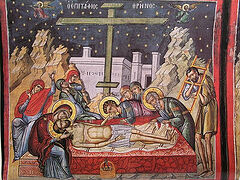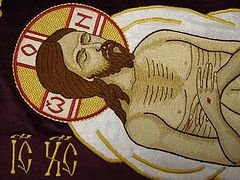Have we ever thought, brethren, about the fact that we have already been in the grave, and that a burial has already been served for us? Let us at least think about this now, at the tomb. For it was precisely in this, in this tomb, that we all were buried.
How did this happen and when? In Baptism, says the Apostle. Know ye not, that so many of us as were baptized into Jesus Christ were baptized into His death? Therefore we are buried with Him by Baptism into death: that like as Christ was raised up from the dead by the glory of the Father, even so we also should walk in newness of life (Rom. 6:3-4).
Baptized into His death! Buried into death! Ah, brethren, however we explain these words, they are all extremely strong and striking. The death of man is something very important, especially the death of the God-Man. And we are all baptized into His death! We are all buried into death!
Whence this wonderfully terrible Baptism? What is this incomprehensible Divine co-burial for? Why was our font a tomb, and moreover the tomb of Christ? In order to understand this more clearly, brethren, we must give heed to the purpose of our Baptism.
What are we baptized for? For the remission of sins, the Church itself responds. That is, explaining this thought more distinctly, we are baptized for the sanctification of our nature defiled by sin, for the restoration of the image of God in it, for the return to it of our primitive innocence and the capacity for virtue and blessedness. But what cleanses and sanctifies us in Baptism? Is it really the water that washes over us in the font? Water can only cleanse the body, and that only outwardly, but not the soul, not the conscience, not the mind and will. For a soul defiled by sin, for a spirit that has fallen into the abyss of evil, a higher, innermost, spiritual purification is needed. And this is effected in Baptism—otherwise, why would Baptism itself be celebrated?
What effects this if not the water? It is effected by the all-sanctifying blood of the God-Man. The font cleanses us because within the water is concealed the grace of the Spirit, brought down to Earth by the Incarnation of the Son of God. Our sins depart from us in Baptism, because a sacrifice was offered for them on the Cross; we come out of the font as sons of God with the right to inherit eternal life, because in the font we were clothed with faith in the merits of the Redeemer, to Whom belongs all the blessings of eternal life. Thus, being baptized for the remission of sins, we are visibly immersed in water, and invisibly into the death and blood of Christ, into the grace of the Holy Spirit. And this invisible immersion makes real the visible Baptism with water, which of itself would have no effect upon the soul. Remove faith in the Crucified One from the font and grace will be removed together with it, and therefore there will be no such remission of sins. Take away the Cross and there can be no Baptism.
This is expressed by the Apostle, brethren, when he says that we are baptized into the death of Christ. But you can be baptized into death without sharing this death. A Christian isn’t baptized into the death of His Lord in this way: Plunging into this death, he himself dies, or, in the words of the Apostle, is buried with Christ.
This co-burial is very clearly expressed for the sensual eye by the immersion of the baptized in water. In being immersed, we conceal ourselves from the world, we as if cease to exist for a time—we are buried; and conversely, coming out of the water, we reappear, we as if begin to exist—we are raised up. This, I say, is seen by the eye itself; but it’s only a symbol. In Baptism, with the visible, figurative burial of the body in water, there in fact occurs an invisible, true burial, embracing the whole man, leaving indelible traces, both temporary and eternal, for his whole life. In order to fully understand this, let us again recall why we are baptized—for the remission of sins.
Thus, we come to the font impure, sinful, old, and enemies of God, but we come out of it justified, purified, children of God, and new people. Where does our old man go? It remains in the font. What happens to it there? It dies and disappears. How and by whose power? By the power of the Cross. Our Redeemer and Lord accepts our sins, our decay and death, our old man in our font, and destroys it by the power of the merits of the Cross, by the all-powerful grace of His Spirit; and in its place He gives us His truth, His life, His power and the rights to immortality and glory. Therefore, we come out of the font as new people. If this salvific change hadn’t taken place in our font, if our Redeemer hadn’t met us in it in such a miraculous way, if we hadn’t died there and hadn’t resurrected with Him, then our font wouldn’t be a grave for our old man. We would have plunged into the water with our sins, and come out of it with our sins. On the other hand, our Redeemer wouldn’t have had the right, so to speak, to take our sins upon Himself in the font and give us His righteousness, to remove the curse from us, and to clothe us with His blessing—if He hadn’t died upon Golgotha for us, if He hadn’t satisfied God’s justice for our sins, if He hadn’t borne our punishment, He wouldn’t have earned all the rights to eternal life for us, and therefore wouldn’t have acquired for Himself the right to obtain the inheritance of eternal life for those who believe in His name and live according to His commandments—as should all the baptized.
Thus, during our immersion in the font there occurs the burial of our old man, because we are immersed not alone but with Christ Who slays it; we are immersed not in water alone but into His Blood; we are not immersed alone, but rather co-immersed. And all of this is worked by faith. By faith our sins will be removed from us and laid upon our Redeemer; by faith His truth is gathered from Him and appropriated to us; by faith we die and resurrect before the judgment of God’s righteousness, in the person of our Mediator. Remove faith from Baptism and there will be no burial together with Christ; and without co-burial there will be no burial of the old man; and without this burial, there will be no spiritual renewal and resurrection. There remains but a simple immersion—a symbol for the eyes, but there will be no power for the spirit, action for the heart, or a Sacrament unto life eternal.
I hope, brethren, that the power of the Apostolic words is completely clear now for us all: “To plunge into death, to be buried into the death of Christ;” and here it’s also clear why the tomb of Christ is a universal font, just as our font is the tomb of Christ.
But brethren, Christianity is not in word, but in power (1 Cor. 4:20), not in concept, but in deed. The truths we are talking about are such that they must embrace and penetrate our entire being and express themselves in our entire life. And this doesn’t even require a separate concept of the relation of our Baptism to the death of Christ: a rather simple faith in the Cross of Christ, simple fidelity to the vows given at Baptism. Is he who doesn’t understand these vows—unless he forgot them through negligence—completely unforgivable?
So, brethren, allow me, on behalf of the Lord Who is reposing in the tomb, to ask you whether you feel the fruits of the mystery of the Baptism into the death of Christ within yourselves—the precious fruits of that wonderful covenant for life and death, which is concluded with our Lord and Savior in the font? If we’re faithful to this Divine covenant, then it should produce much within us—it should bring peace to our conscience, light to our mind, purity to our heart, holiness to our life; it should amend and perfect our whole way of thinking and feeling, sanctify all our relationships and connections, make us new people, pleasing before God and man, worthy of blessings on Earth and in Heaven, elevated above all the vicissitudes of the world and life. I must say: The Blood of Christ into which we were immersed in the font cannot be fruitless. It’s not in vain that the Lord ascended the Cross and descended into the tomb; it’s not in vain that He descended into our font and was buried with us in it. The fruit of this must be eternal life, which will be revealed in all its glory in eternity, but should be revealed in its all power here, during our earthly life.
Is this true for us, brethren? Has our old man with its passions and lusts remained buried forever in the font? Has it not risen, and does it not act in us tyranically? And instead of it, was it not our new man, with which we came out of the font, that was buried? It shouldn’t be difficult, brethren, to answer these questions.
Death and resurrection aren’t invisible things that are unrecognized or hidden. The dead Christ was seen by all; His own enemies acknowledged Him as dead. Is this so with us? Has at least one person said that we’re dead to the world and sin? Have we ever felt this for ourselves—in our conscience? The Risen Christ was seen by many; He even allowed Himself to be touched by unbelievers. Is this how it is with us, brethren? Can we tell people who don’t believe in the power of Baptism, in the grace of renewal, what Christians once told pagans: Come and see this renewal in the lives of the baptized, in their good works and their moral purity. At the very least, having been buried with Christ in Baptism, have we begun to walk in the newness of life received from Him? Are we not, rather, completely idle on the path to salvation; are we not sitting carelessly on the seat of the destroyers; are we not lying down and sleeping in the sweetness of sensuality? I’ll ask one more question: Do we at least remember that we were once baptized into the death of Christ, that the white garment in which we were adorned when we came out of the font was made from the shroud of our Lord? Alas, how many Christians are unable to give an affirmative answer to this last question! My God, what does our Christianity mean if we don’t remember into Whom and what we were baptized?
The greatness of the tomb of Christ is not diminished, brethren, by our ingratitude: The Lord remains the master of Heaven and Earth even with all our betrayals of Him. But what will happen to us if we, having lost the grace of our Baptism, don’t return to it through repentance? Instead of interceding for us, will not the all-sanctifying Blood of the Covenant cry out against us and ask for vengeance? Thus, let us hasten while there is yet time, to be baptized again by the tears of the true repentance; let us hasten to cleanse ourselves with the Blood of the Covenant, until it ceases to flow from the Divine wounds. He calls all day, all our lives, stretching out His hands to us from the Cross; but we pay no heed and we don’t come: There will come a time when some will call out to Him, but He won’t hear those who didn’t listen to Him. May we not be found among them!
Amen.




